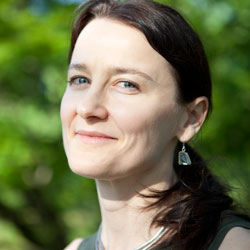Where does evil come from?
what do you mean “where”
from a human being
always a human being
and only a human being
a human being is a work-related
accident
of nature
an error
if humankind
disentangles
itself
from flora and fauna
the earth will regain
its beauty and lustre
nature its purity
and innocence
human beings are the only beings
who use words
which can serve as tools of crime
words that lie
wound infect
evil does not come from an absence
or out of nothingness
evil comes from a human being
and only a human being
we differ in thought – as Kant said –
and for that matter in being
from pure Nature
Notes on the Poem
Joanna Trzeciak's translation from the Polish of Tadeusz Rozewicz's poem "Unde malum?" captures the age-old philosophical struggle with the problem of evil, how one can reconcile the existence of evil with that of an all knowing, all powerful and benevolent deity. Not only do Rosewicz's ruminations add to the body of thought about this dilemma, but they spark responses in fellow thinkers and poets. The original version of Rozewicz's poem in Polish was published in 1998, in a collection entitled zawsze fragment. recycling. Fellow Polish writer Czeslaw Milosz then responded to that poem in Polish, and then it was translated into English and featured in The Guardian in 2001. After you read Joanna Trzeciak's translation on this page, you can read Milosz's response here. The tradition of answer or response poems is a long one, and as one essayist observes, "for the answer-poet the verse exchange represents a means of imposing an alternate outlook upon a contending poetic statement." This course material also discusses many methods that the answering artist can employ to craft a response to a work that has inspired debate. What do you think of the approach Milosz has taken, and do you think his response is effective? As Rosewicz, in Trzeciak's translation, observes: "human beings are the only beings who use words which can serve as tools of crime" In tandem, Rozewicz/Trzeciak and Milosz also use words as positive tools to advance a challenging subject with poetic conversation.
